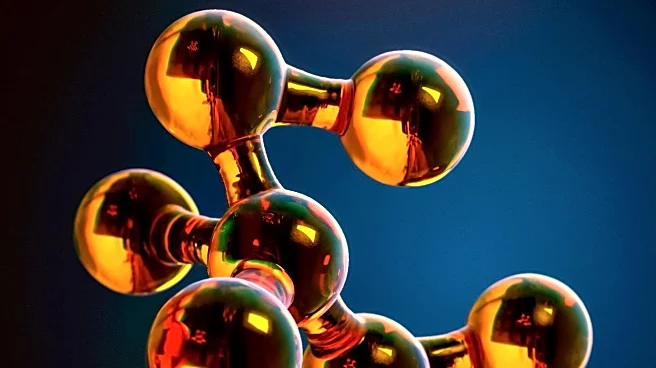What is the story about?
What's Happening?
Researchers from the University of Bergen, QIMR Berghofer, and Flinders University have discovered that adding bacteria-killing nanoparticles to vinegar can enhance its antimicrobial properties. The study, led by molecular biologist Professor Nils Halberg, found that carbon and cobalt nanoparticles can boost vinegar's ability to weaken bacterial strains, making other treatments more effective. This development is significant in the fight against antimicrobial resistance (AMR), a growing global health threat identified by the World Health Organization. The nanoparticles, when combined with weak acetic acid, were able to kill several dangerous bacterial species, including drug-resistant Staphylococcus aureus and Escherichia coli. The treatment was tested on bacteria and human skin cells, showing promising results in removing infections without affecting wound healing.
Why It's Important?
The rise of antimicrobial resistance poses a significant threat to global health, as it makes infections increasingly difficult to treat. The development of nanoparticle-enhanced vinegar offers a potential new method to combat this issue, providing an alternative to traditional antibiotics. This approach could be particularly beneficial for vulnerable groups, such as the elderly and those with chronic health conditions, who are at higher risk of chronic wounds and infections. By preventing bacteria from developing resistance mechanisms, this treatment could help curb the spread of AMR and improve patient outcomes.
What's Next?
For the nanoparticle-enhanced vinegar to be used in clinical settings, it must undergo pre-clinical and clinical trials to ensure its safety and efficacy in treating serious wound infections. Researchers are optimistic that this combination treatment could be integrated into existing medical practices, potentially as a direct application to wounds or as an irrigation solution. The success of these trials could lead to broader adoption of this innovative approach in healthcare, offering a new tool in the fight against antimicrobial resistance.
Beyond the Headlines
The use of nanoparticles in enhancing traditional treatments highlights the potential for nanotechnology to revolutionize healthcare. This approach not only addresses the immediate threat of AMR but also opens the door to further research into how nanoparticles can be used to improve other medical treatments. The ethical implications of using nanotechnology in medicine, including safety concerns and regulatory challenges, will need to be carefully considered as this technology advances.

















